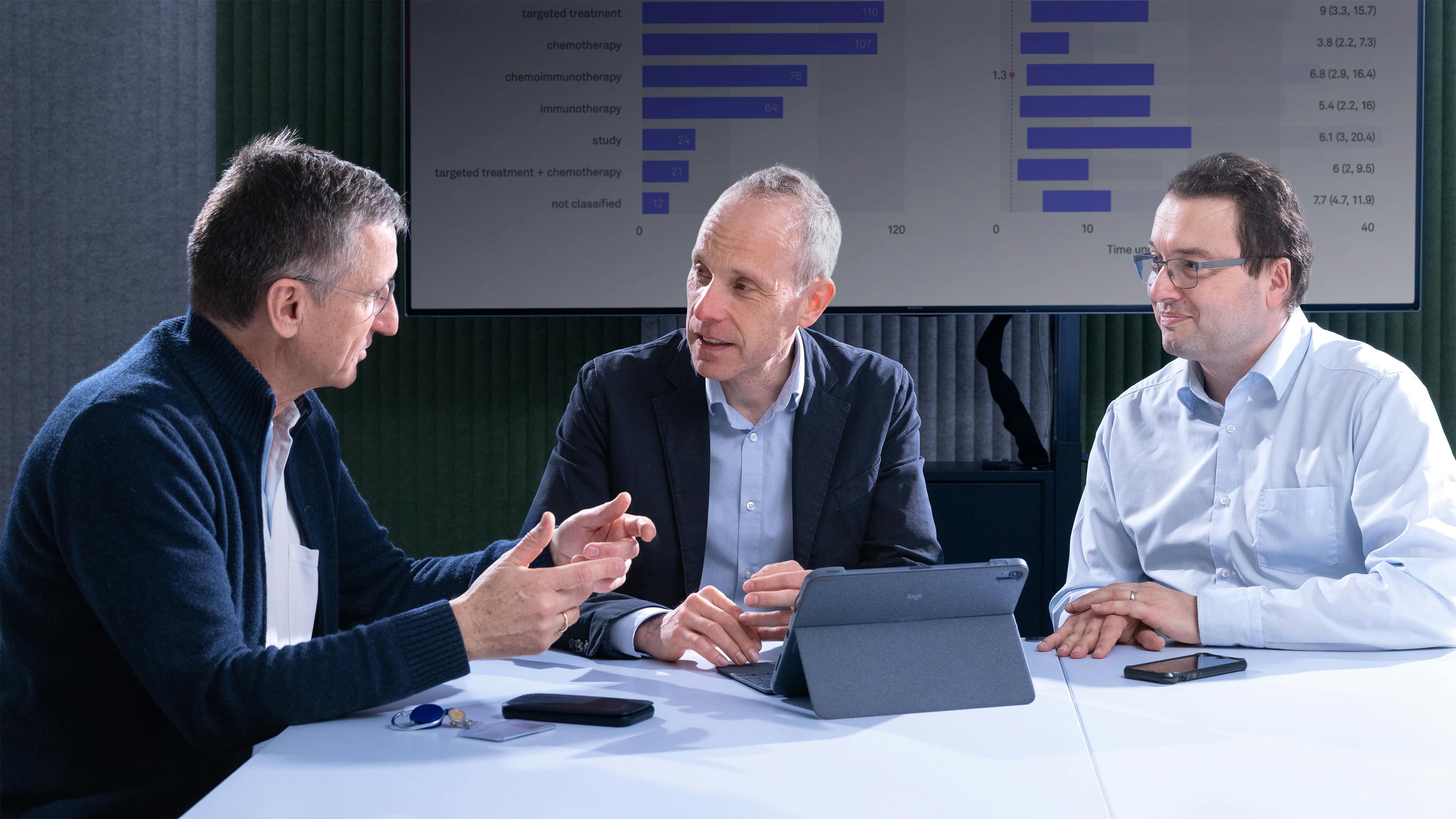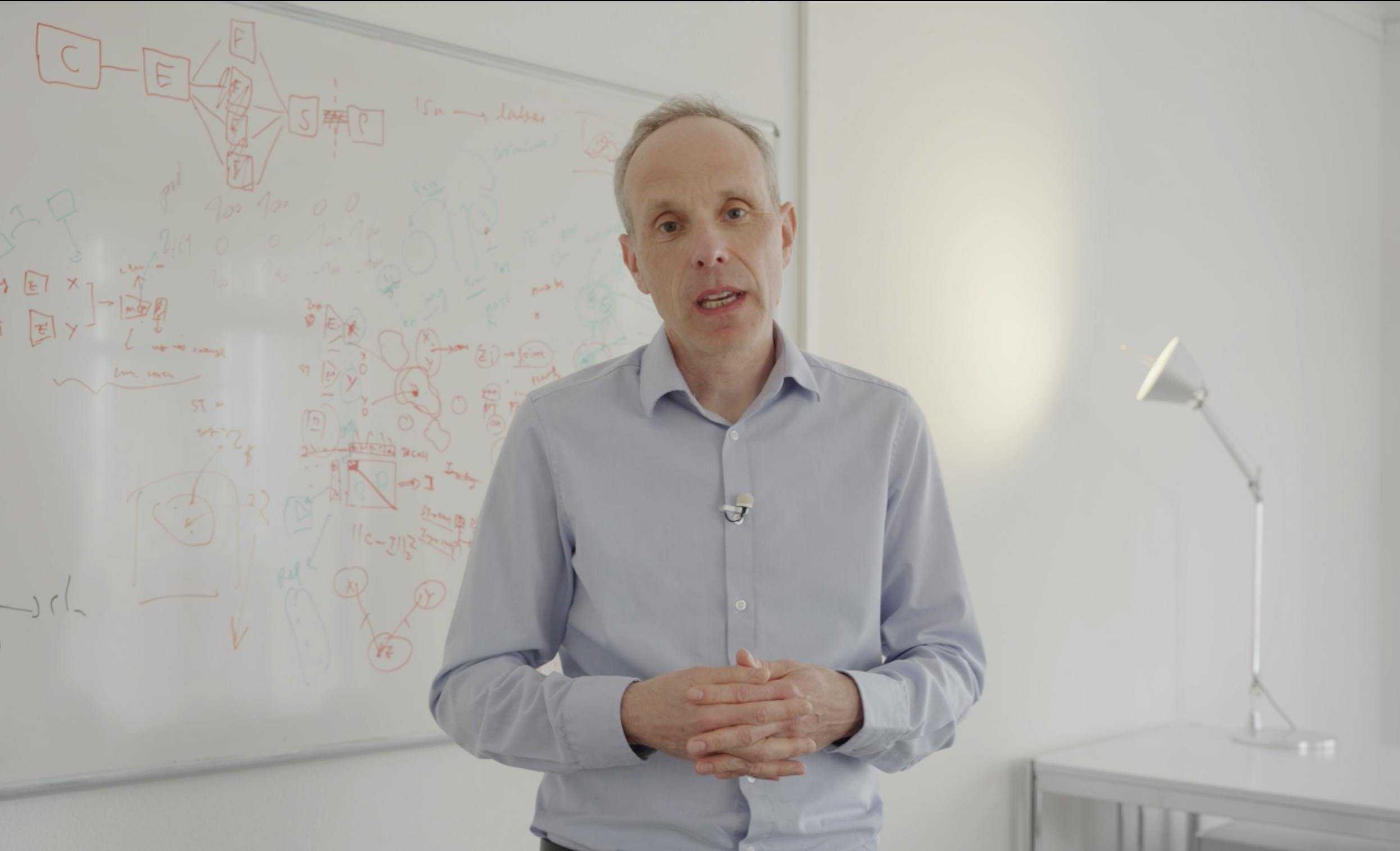
Digital assistant for cancer treatment
Artificial intelligence (AI) has the ability to advance precision treatment of cancer as data can be used to predict the course the disease might take with greater accuracy. This saves resources and, far more importantly, valuable time. The «AI tumor board» will help AI to establish a foothold at both University Hospital and University Children’s Hospital Zurich.
Contact
Prof. Dr. med. Andreas Wicki
Professor for Oncology at the University of Zurich
Clinical Director of the Tumor Center at University Hospital Zurich
+41 44 255 21 54
E-Mail
UMZH institutions
University of Zurich
University Hospital Zurich
University Children’s Hospital Zurich
Team
University Hospital Zurich (USZ) is a hive of activity. The time is approaching 2 p.m., and Andreas Wicki, Professor of Oncology at the University of Zurich, is striding towards the consultation room. Today is Thursday, and the tumor board is about convene here for its weekly session. There are over 20 tumor boards at USZ – one for every organ. Similar meetings are also held on a weekly basis at University Children’s Hospital Zurich. «Tumor boards are now an indispensable element of modern oncology,» explains Wicki. An opportunity for selected medical specialists from the fields of surgery, radiology, oncology, and pathology to get together, as well as nursing professionals. Their interdisciplinary collaboration allows them to develop tailored treatment approaches that are targeted to the needs of their cancer patients.
AI in clinical practice
In future, the basis for discussions at these meetings – patient data, medical treatment guidelines, and imaging material – is to be prepared and collated by the «AI tumor board». «The AI tumor board establishes AI, or artificial intelligence, in clinical practice,» says Professor Michael Krauthammer, Head of the Department of Quantitative Biomedicine at the University of Zurich. The «AI tumor board» research project is set to run for three years and is receiving financial support from «The LOOP Zurich.» Professors Andreas Wicki and Michael Krauthammer, as well as Jean-Pierre Bourquin from University Children’s Hospital Zurich, have been working towards its implementation, together with their teams, since the fall of 2024.
When physicians first discuss the optimal treatment for a cancer patient, they have a powerful digital ally to call on. «The AI tumor board trawls through treatment guidelines, genetic profiles, molecular data, medical images, and previous treatment results at an unprecedented speed,» explains Wicki. The system’s ability to take account of the specific, biological features of each individual patient's cancer cells is of particular value.
The «AI tumor board» may also be able to uncover hidden patterns in clinical studies and patient data. It recognizes which therapies are the most promising for given genetic profiles. «This leads to faster and more accurate diagnoses, as well as more bespoke therapy recommendations,» stresses Krauthammer. This development gives patients hope: they are more likely to get the precise treatment that will deliver the optimal impact for their specific tumor. A decisive step in the journey toward truly personalized medicine, according to Krauthammer.

«With the AI tumor board project, we use artificial intelligence to systematically analyze patient data and identify the best possible individual therapy more quickly», says Michael Krauthammer in the video. He is Head of the Department of Quantitative Biomedicine at the University of Zurich.
Building up a treasure trove of data
The new «AI tumor board» relies on a wealth of data – a case of the more, the better. «The biggest challenge is how to link up the various databases from hospitals and scientific studies,» points out Krauthammer. Many of these systems do not communicate with each other or simply do not have suitable interfaces.
The solution being worked on by the team behind the «AI tumor board» is both elegant and effective: «We are going for a federal data structure,» explains Fabio Steffen, a postdoctoral researcher at University Children’s Hospital Zurich and member of the development team. Specifically, this means that valuable medical information stays where it is – on various independent systems. It can still, however, be linked together and used accordingly without jeopardizing data protection. This decentralized architecture makes it possible to break open data silos without actually moving them – a decisive advantage in the sensitive context of patient data.
More time for patient care
The kinds of things that currently require laborious research work by physicians are expected to be handled by the «AI tumor board» in a few years. «This will reduce much of the workload on medical staff, saving valuable resources and freeing up more time for patient care,» emphasizes Wicki, looking ahead.
Human experts will continue to make the decision regarding therapy – but they will be able to do this after a successful evaluation phase, based on far more comprehensive information and prepared in a much more systematic way. In years to come, these digital assistants, working away in the background, may become the decisive factor for cancer patients.
Transparency as a key factor
But one question remains: How reliable is the information that the «AI tumor board» will deliver? Although it is still in the development phase, the vision is clear: once the system is ready to use, it will not only compile relevant medical data, but also provide transparent explanations as to how it reaches its subsequent conclusions.
«Unless the decision-making processes can be understood, even the most powerful AI is of little help. Physicians must be able to trust the results,» explains Bourquin. Another important aspect is how the decision is ultimately always made by humans – a point that Bourquin highlights as essential for patient safety. «AI will not be making life or death decisions anytime soon. Humans will have the last word.» He does concede, however, that artificial intelligence is becoming increasingly indispensable in medicine. Its ability to analyze huge volumes of data opens up new perspectives.
As Wicki underlines: «No physician can comprehend and compare the huge volumes of data available in modern medicine in this kind of depth. The days of physicians skimming through paper documents with highlighter pens are over,» says Wicki. The biggest challenge now facing the developers of the «AI tumor board” is how to create a system that not only delivers excellent analyses, but also communicates them in a way people understand. Only then will AI become a trustworthy partner and find its place in day-to-day clinical work.
Service
Would you like a second opinion?
The center of excellence known as the Comprehensive Cancer Center Zurich offers you quick and easy access to a cross-disciplinary range of oncology expertise.
Overview of all ongoing oncological studies at the university hospitals in Zurich: Krebsstudien Zürich (page in German)
Who is co-financing this project? (in CHF millions)
The LOOP Zurich and Promedica Stiftung
Project funding
started in 2024
Credits
Text: Marita Fuchs
Pictures: Frank Brüderli
Video: Daniel Grunder
University of Zurich: Michael Krauthammer, Andreas Wicki, Jean-Pierre Bourquin, Ana Claudia Sima
University Hospital Zurich: Andreas Wicki, Michael Krauthammer
University Children’s Hospital Zurich: Jean-Pierre Bourquin, Fabio Steffen





